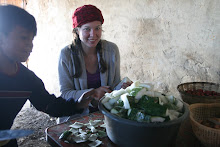There's been a lot of anxious hustle and bustle at the health center this week based on a new statistic that is out. Last week we suffered our first maternal mortality this year.
Can we organize the midwives and do a seminar on how to prevent a death like this? Who should visit the family to find out what went wrong? Are supervisors from the Ministry of Health going to come investigate our health center?
The mother who died was only sixteen--practically a child herself. In the past, women knew that the most dangerous thing they would do in their lifetime was to give birth. But over the past 100 years, maternal mortality rates have dropped dramatically, even in countries like Guatemala.
I wonder: Did she know the danger she was in when she felt her labor pains? Had she spent her pregnancy eagerly anticipating a new baby, or was it a time filled with anxiety about how she would feed and clothe her son, much less survive the birth? Did she get to see him at all? Or were her last moments a delirious blur of worried faces due to blood loss?
I don't know the answers to any of these questions. Nor do I know the answer to a more profound asking of "Why?"
But I think it has something to do with the social and economic factors that lead up to an uneducated sixteen-year-old to give birth in a non-sterile environment (a tiny home with dirt floors) with an incompetent midwife. When it comes to poverty, all the issues are interconnected--health, education, wages, family.
Consider her son. He will now be deprived of the most nutritious food available, breast milk. This is an enormous disadvantage. His family might not be able to afford powdered milk or formula, putting him at great risk for malnutrition. Because it's so hard to sterilize baby bottles, he's also at greater risk for many diseases, including the diarrheal diseases that are too often fatal to poor children here.
Socially, his father, if he was involved at all, will not be able to spend much time at home as he will spend his days farming. There's a good chance he'll go to be a migrant laborer, either in the fruit and coffee plantations on the coasts or all the way to the US. Without the proper love and discipline of a parent, he will be at greater risk for dropping out of school, and becoming a teenage husband himself.
Poverty is a giant, indescribably ugly circle.
Subscribe to:
Post Comments (Atom)

No comments:
Post a Comment